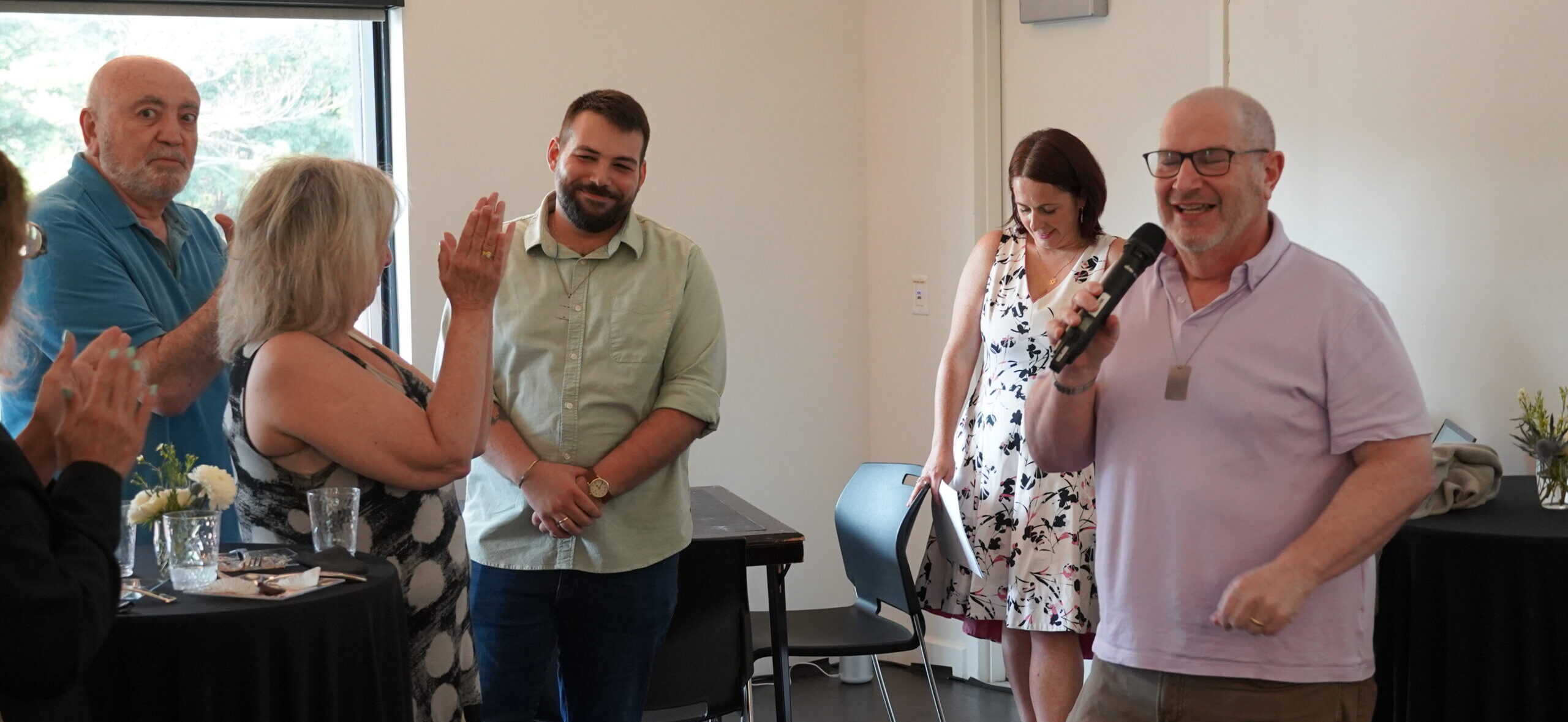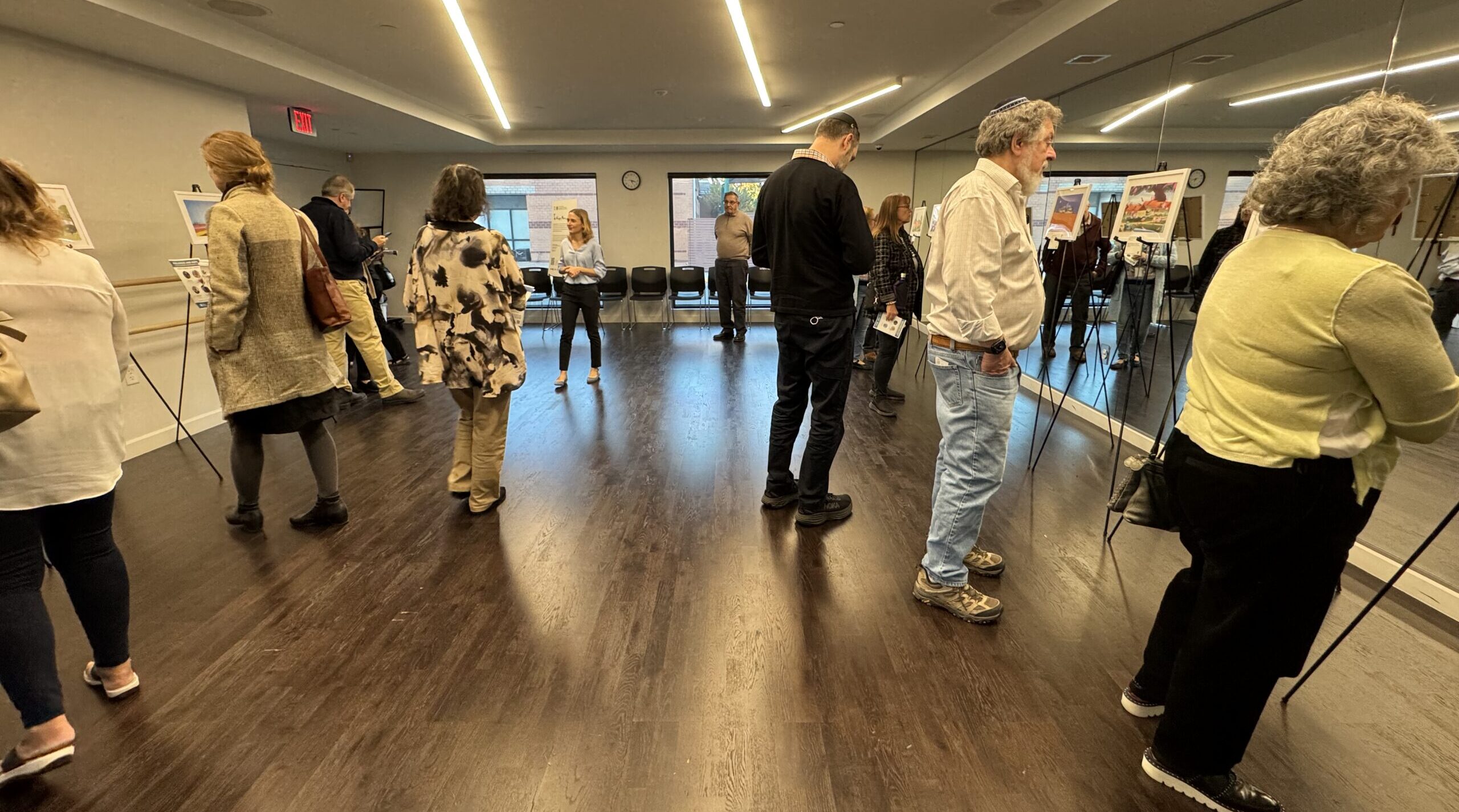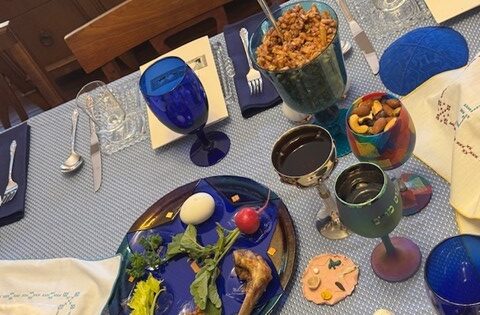It has been over one year now since Hamas raided Southern Israel, murdering approximately 1,200 Israelis and capturing more than 200 people as hostages. Over one year since Jewish communities around the world began holding their breath amid death and destruction. Over one year since they began experiencing every emotion at once: from grief to frustration to anger and, despite it all, unrelenting hope.
In the immediate wake of Oct. 7, and the months that followed, Pozez JCC has been stepping up to provide the NoVa community with comfort, education, and programming to process the massacre and its aftermath. Finding solidarity in community has been priority No. 1.
People of all ages have come together again and again, turning their grief into action. And often, Dean Bagdadi has been the person guiding them.
As Pozez JCC’s shaliach – Israeli emissary – Dean connects the NoVa Jewish community with Israel through conversations and experiences informed by his life in Israel and his service in the Israel Defense Forces.
When the war first broke out, he wasn’t only fearful for his community and his country, but for his loved ones who were being called up to serve. Despite the desire to return to Israel and fight alongside them, Dean knew the NoVa community needed a leader to help them work through this trauma.
“After we knew what was happening, our first thought was ‘What can we do? What does our community need us to do?’” he said.
Dean and the rest of the JCC staff coordinated with other Jewish organizations in the area to host a vigil only five days after the Oct. 7 massacre. With over 1,600 people physically and virtually in attendance, including elected officials and clergy from all denominations, the gathering was moving and meaningful, offering comfort to those in mourning.
“There was a sense of a strong, united community that came together to express solidarity,” noted former shaliach Shy Ashkenazi. “In a dark time of confusion and pain, where I, as an Israeli far from Israel, felt very much alone and scared, it offered an opportunity to show up and belong.”
Sigi Saadia, who teaches Hebrew classes at Pozez JCC and often works alongside Dean to educate the NoVa community about her home country of Israel, credited the JCC with helping her navigate the pain of being so far from her family.
“For a week, I couldn’t function at work or at home,” she said. “I felt the need to drop everything and go to Israel, but I couldn’t. Standing at the vigil and watching the amount of people that came and the unity between the organizations made me feel that I was not alone.”
In December, just a few months after the attack, more than 200 community members came together again to bear witness to these horrors at a panel discussion with four survivors of the Oct. 7 massacre. Organized by Pozez JCC, JCC Association of North America, Israel’s Ministry for Diaspora Affairs, and World Zionist Organization, this event empowered Yael Simon, Daniel Weiss, Orin Bokobza, and Sharon Ana Yakobi to share their harrowing stories.
The discussion not only educated the NoVa Jewish community, but it helped the Israeli survivors navigate their trauma.
“It was deeply meaningful to make them feel welcomed,” explained Dean, who moderated the discussion. “The sheer lack of empathy we’ve seen since Oct. 7 is extremely painful. So to host them, feed them, give them a strong hug, and a warm embrace was equally important. And we made four Israelis, who’ve been through the worst thing a human being can go through, feel like they are not alone.”
Those welcoming hugs kept coming at the end of the panel discussion, when many attendees stayed afterwards to express their gratitude and support for the survivors.
Dean reflected, “We were amazed by their courage and resilience. We can only aspire to be as strong as they are.”
This aspiration led to the creation of virtual evening discussions and in-person group sessions at local synagogues, offering teenagers to adults a safe space in which to ask questions about Israel and connect both physically and spiritually with each other.
“We’ve seen an increasing number of people looking for spaces to feel safe, and I think we did that,” Dean expressed. “We made people safe.”
Jeff Dannick, Pozez JCC’s executive director, had the opportunity to visit Israel in January, meeting with survivors and their families and seeing the horrific destruction firsthand. He expressed his gratitude to Dean for “bringing Israel to Northern Virginia” for those who weren’t able to go themselves.
“I can’t even begin to express how fortunate we are to have Dean Bagdadi as our Senior Shaliach,” he said. “He has been nothing short of extraordinary, shepherding our community through this tragic period while simultaneously dealing with the personal impact to him and his family and friends. I am so grateful to Dean, and his wife Rotem, for their dedication, commitment, and service to our community.”
Opportunities for solidarity and advocacy continued throughout the year, often led by Dean. Noa Argamani, one of the former hostages who was rescued by the IDF in June of 2024, was a friend from his hometown. Prior to her release, to ensure no one forgot her or the other hostages, Dean and his coworkers hung posters of their faces and organized an effort to cook some of their favorite recipes to keep them at the forefront of the community’s hearts and minds.
In May 2024, as part of the JCC’s Yoms programming, which honors Israel’s Independence Day and Memorial Day, Pozez JCC brought in Israeli musician Jimbo Jay for a concert reflecting on life in the Gaza Envelope to commemorate Yom Ha’Atzmaut. And, as part of its Yom Hazikaron observance, the JCC worked in partnership with the Friends of the IDF to display photos of every Israeli soldier killed in action, honoring their memories and their legacies.
“Many of those names and faces I will always carry with me,” said Ryan Gardiner, a Pozez JCC board member. “Initiatives like that strengthened our resolve as a community and gave us purpose in supporting Israel in its war for survival.”
In June of 2024, Pozez JCC and other Jewish organizations continued to honor the victims of this war by co-hosting a screening of “Screams Before Silence,” a film featuring survivors’ firsthand accounts of Oct. 7 and highlighting the gender-based violence perpetrated by Hamas on and since that day.
Over 100 community members attended and participated in the accompanying panel discussion, led by Amanda Katz, the executive director of the Jewish Coalition Against Domestic Abuse, and Rachel Graber, the vice president of government relations and advocacy at Jewish Women International. The conversation was meant to help people process their emotions, from outrage to sorrow to disgust.
Speaking about his own feelings, Jeff shared, “For me, the personal stories of those who survived the Oct. 7 attack, or those whose loved ones were killed or taken hostage, have been the most powerful and painful. As we approach the one-year commemoration of Oct. 7th, I am grateful to all of the organizations and individuals who have helped our community learn, mourn, and heal.”
To commemorate one year since the Oct. 7 attacks, Pozez JCC is hosting or partnering on five community-wide events alongside other local Jewish institutions. Here are upcoming programs:
Cards and Clothes for a Cause
Clothing Drive: This High Holiday season, join Pozez JCC in supporting those in Israel by donating new children’s clothing (with tags intact), for any season, to be sent to those in need. The clothes collected will be sorted and packed at the Cards and Clothes for a Cause events on Oct. 21 at Pozez JCC and Shaare Shalom. Please drop off clothing donations in the JCC lobby. All of the clothing will be sent to Israel from Yad Leah, an organization that supports those in need in Israel.
Cards and Clothes for a Cause | Oct. 21
Join Pozez JCC for a meaningful and impactful event as the community comes together to support Israeli families in need as Israel continues to feel the ongoing impacts of the trauma of Oct. 7.
For young families: 5:30 p.m. | Pozez JCC: Register here
For teens and adults: 7 p.m. | Pozez JCC: Register here
For all ages: 7 p.m. | Congregation Shaare Shalom, Leesburg: Register here
Resilience and Hope: An evening of art and storytelling: Oct. 27, 5 p.m. | Pozez JCC
Oct. 7, 2023 as marked on the Jewish calendar is commemorated two days after Sukkot. This year, that falls on the 27th day of Tishrei. The evening is designed to encourage conversations about resilience and hope through an artistic lens. The program will explore Israel’s post Oct. 7 reality through varied art forms, helping to examine the consciousness of Oct. 7 in a different way. Participants will be invited to experience several creative spaces to listen to the personal stories of the artists and take a closer look at how life in Israel has changed over the year. Register here
We hope that you were able to attend these events that have already taken place:
A screening of the SuperNova documentary film on Sunday, September 29th, hosted by JCRC, screened at Pozez JCC: Filmed just a few days after Oct. 7, this film recounts the stories of survivors, first responders, and parents. Using materials meticulously collected from dozens of sources, including Hamas’ own cameramen and GoPros, survivors’ mobile phones, CCTV footage, dash cams, and first responders on site, this film provides unprecedented insight into the massacre.
Commemorating October 7th: A shared service with local institutions, Oct. 6th at Temple Rodef Shalom: The NoVa Jewish community joined in prayer to mark one year since the horrors of Oct. 7.
Marking October 7th Together: An evening of remembrance: Oct. 7, 7 p.m. | The Anthem
Nearly 6,000 people of all ages, backgrounds, and identities gathered at The Anthem and online to mark one year since October 7th. We joined hands and hearts to mourn, to stand resilient, and to hope. We began in tears – and we concluded with song, dance, and the pride and joy of being Jewish. Thank you to all who made this evening of remembrance, resilience, and hope a reality. Watch the livestream recording
This past year was one of immense grief and devastation, one which could have easily rendered the NoVa Jewish community paralyzed with pain. Instead, with the guidance of Pozez JCC, this community channeled its grief into action and advocacy, helping not only themselves but the Israeli community as well.
Now, as a new Jewish year begins, ushering in renewed hope and continued mourning, Pozez JCC will keep convening the community, providing safe spaces in which to work through these emotions and ensuring that no one is ever alone.
“We have more work to do,” Jeff declared. “War is still raging. Hostages remain in captivity. Entire communities have been and remain evacuated. Innocent people are being injured and killed, and peace continues to be an elusive dream. So we, as a community and a people, must persevere b’yachad – together.”

























